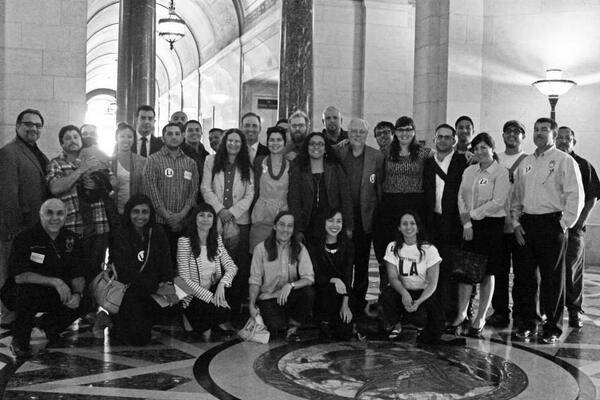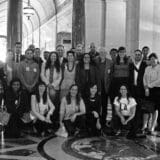


Today, Mayor Garcetti will deliver his first State of the City address to outline his goals and vision for the coming year. One can expect a focus on his “back to basics” message of creating a stronger economy and more efficient and effective city government. As he delineates those “basics” and how he hopes to achieve them and pay for them, the Mayor needs to make sure he is taking a full accounting of what’s happening in his own City Hall backyard – ensuring that the fulfillment of his vision doesn’t come at the expense of our streets, communities or workers. An item that requires his immediate attention is the draining of hundreds of millions of dollars from city taxpayers each year.
It turns out that the city of Los Angeles spends more than $200 million on annual fees to Wall Street banks and other financial institutions. This eye-popping figure is detailed in a new research report released by Fix LA,


Everyone is talking about living wages, but few have actually written the laws that stand behind them. Margo Feinberg has done just that. As an activist labor attorney for more than 30 years, she has played a critical part in shaping groundbreaking legislation, including a worker retention law to ease the plight of workers in industries that change management frequently, as well as a landmark superstore ordinance to protect neighborhoods from the blight that often follows in the wake of a Walmart. Currently, Feinberg is involved in a campaign to secure sick days for nonunion grocery store workers, many of whom have no such benefit. In recognition of her accomplishments and commitment to economic justice and working families, she will be honored at the Los Angeles Alliance for a New Economy’s Women for a New Los Angeles Luncheon on May 9. We spoke to Ms. Feinberg about her life and work,
» Read more about: Giving Workers a Voice: An Interview With Margo Feinberg »



About seven years ago I was at my first meeting of an education advisory board, staring out the window at the panoramic view of the Santa Monica Mountains, when a fellow sidled up and began making casual conversation. We exchanged a few pleasantries, when he leaned in to tell me in a confidential hush that he had a $34,000 tax problem. Taken aback, I first thought, How odd that he should share such a thing — and figured maybe he wanted sympathy.
Then it occurred to me that his tax problem was more than half what I had made altogether that year, so I said, “If you have that big a problem, you must have the resources to deal with it.” He backed away and never spoke to me again at that meeting, or at any thereafter.
I suppose that makes sense. He assumed I don’t like taxes the way he dislikes them.


 Most Americans today know that Reverend Martin Luther King Jr. was killed 46 years ago in Memphis, Tennessee. But fewer know why he was there.
Most Americans today know that Reverend Martin Luther King Jr. was killed 46 years ago in Memphis, Tennessee. But fewer know why he was there.
King went to Memphis to support African American garbage workers, who were on strike to protest unsafe conditions, abusive white supervisors, and low wages — and to gain recognition for their union. Their picket signs relayed a simple but profound message: “I Am A Man.”
If he were still alive, King would surely join the growing campaigns to unionize and improve pay and working conditions for janitors, security guards, hotel workers, hospital employees, farmworkers, grocery employees, and others who earn poverty-level wages. He might disrupt Walmart stockholder meetings to demand that the company pay employees a living wage, join fast-food workers in their quest for decent pay, and urge consumers to boycott the Gap, Walmart and other companies until they stop manufacturing their products in overseas sweatshops.
» Read more about: MLK’s Last Campaign Was for Workers’ Rights »
Gone but certainly never forgotten, Pete Seeger’s life and music will stand front and center this Saturday afternoon as the Ash Grove Foundation honors him with a hoedown on Wilshire. The lineup features a mix of 10-minute musical tributes, personal recollections and spoken word. Guests will include local blues demigod Bernie Pearl, singer Claudia Lennear (seen in the documentary Twenty Feet From Stardom) and civil rights movement protest singer Len Chandler. (Grammy-winning singer Ben Harper, ex-Blaster Dave Alvin, Chicano rockers Quetzal and others are unconfirmed invited artists.)
If the music isn’t enough to draw you in, City of Quartz author Mike Davis will also participate in the proceedings, as well as poet-filmmaker S. Pearl Sharp and people’s lawyer Art Goldberg – there’s even talk of his sister Jackie appearing, too. See you there at the First Unitarian Church’s Fritchman Hall, 2936 W. Eighth St.;
» Read more about: Pete Seeger: A Tribute to His Music and Legacy »



As the saying goes, it takes a village. And when corporations spend vast resources to gain control of public services, it takes a village of smart, savvy and nimble people and organizations to beat them back. That’s exactly what happened in Arizona this week.
Last Friday, Arizona House Appropriations Chairman John Kavanagh snuck $900,000 into the state budget earmarked for GEO Group, the nation’s second largest private prison company. That amount was above and beyond the $45 million GEO already rakes in from Arizona taxpayers. Interestingly, the Arizona Department of Corrections did not request the increase. According to the Arizona Republic, GEO’s lobbyists worked directly with Kavanagh, who, when asked to justify the earmark, said simply that GEO “wants to get more money.”
Private prison critics quickly sprang into action. The American Friends Service Committee and Human Rights Center helped lead a strong coalition that included the American Civil Liberties Union,


On Tuesday — April Fools’ Day no less — Los Angeles’ City Council nearly unanimously approved the Zero Waste LA Franchise System, which would make it the first and largest city nationally to adopt a robust plan to move towards Zero Waste. The Zero Waste LA Franchise System, under the direction of the City of Los Angeles’ Bureau of Sanitation, will transform the antiquated waste and recycling system that currently serves apartment dwellers and businesses. In its place will emerge an innovative model for the nation. This new system will carve the city into 11 waste service zones intended to boost recycling and provide strong customer service – a similar success found in the city’s single-family waste and recycling programs.
The Zero Waste LA franchise plan specifically requires trash-hauling companies to bid for exclusive contracts to operate in the 11 waste service zones. This will help the city to meet its Zero Waste goals,
» Read more about: Los Angeles City Council Boldly Approves Zero Waste LA Plan »



We’ve written on more than one occasion here about the travesty that is the National Collegiate Athletic Association (NCAA) and its treatment of big-time college athletes. So obviously we take great pleasure in the ruling last week, made by a regional director of the National Labor Relations Board (NLRB), that said football players at Northwestern University are employees and ordered an election for those employees to decide if they want to be members of the College Athletes Players Association (CAPA).
The ruling itself is one the feds can be proud of, properly reducing the question of employee status to its core issues—do the players perform a service for money, subject to the control of the person paying them the money?
With football players, the answers are pretty clear. Their coaches require them to sign a contract, make them work 60-70 hours some weeks, control their lives down to the most minute detail and in exchange give them various forms of compensation,
» Read more about: Of Football and the Limits of Labor Law »


 The civil rights movement of the 1960s is now iconic. Who would speak out against its aims? And the farm workers are finally getting their due as Cesar Chavez and the power of the organization he led are being recalled in film and literature. But who speaks up for the women’s liberation movement? In popular culture, its activists were usually portrayed as self-centered, bra-burning,* man-hating New Yorkers.
The civil rights movement of the 1960s is now iconic. Who would speak out against its aims? And the farm workers are finally getting their due as Cesar Chavez and the power of the organization he led are being recalled in film and literature. But who speaks up for the women’s liberation movement? In popular culture, its activists were usually portrayed as self-centered, bra-burning,* man-hating New Yorkers.
To create an historic record of what really happened in the women’s movement, and to rescue it from ridicule and misconceptions, Boston University recently organized a conference titled, “A Revolutionary Moment: Women’s Liberation in the Late 1960s and Early 1970s.” The gathering drew more than 600 people — about two-thirds women activists and academics of that certain age, and one-third younger women and men interested in getting the history right.
In the opening conference session feminist historian Sara Evans explained that the spark that lit women’s liberation came from the other movements of the 1960s,



Working families know that making ends meet is not easy. Low and stagnant wages cannot cover the ever-increasing cost of basic expenses, leaving workers and consumers constantly scraping the bottom of the barrel. Nearly half of all Americans lack the incomes they need to be secure, according to research by Wider Opportunities for Women (WOW).
In Los Angeles, these challenges have inspired a new proposal to give workers in the city’s largest hotels a raise to $15.37 an hour. Across the country there is a growing national movement to raise the federal hourly minimum wage to $10.10.
Renewed attention to issues of economic insecurity and income inequality provide us an opportunity to ask an important fundamental question: what do working families really need to get by?
WOW answers this question by crunching the numbers. Our Basic Economic Security Tables™ measures the incomes that California’s working families need by determining the true cost of households’ basic expenses – such as food,